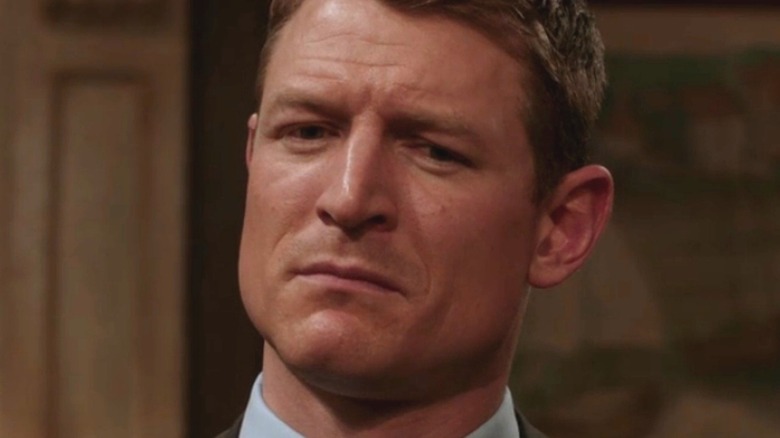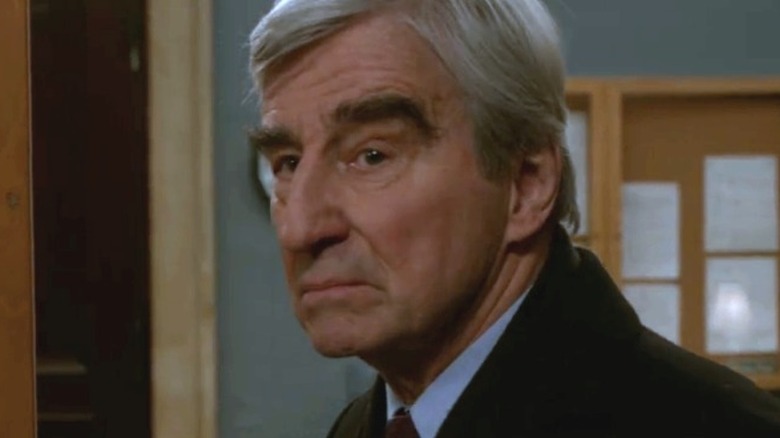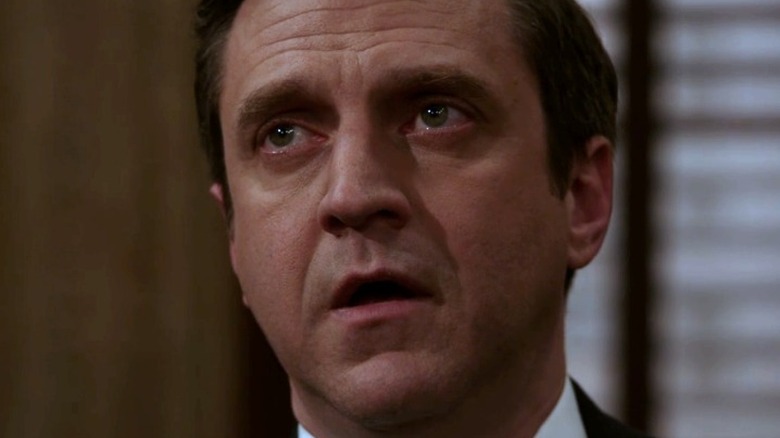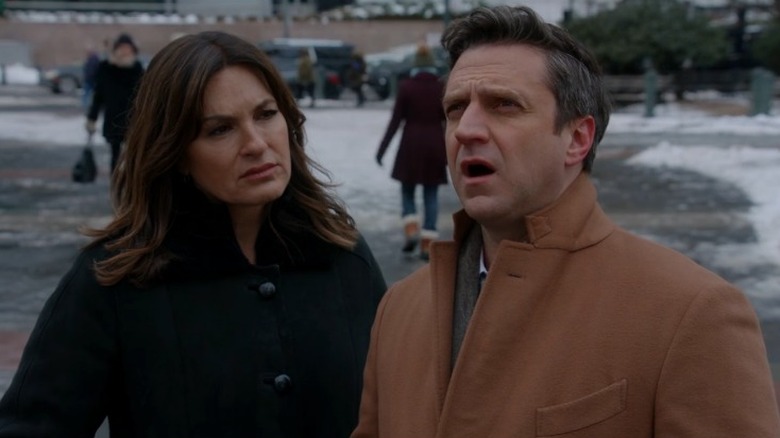This Is The Exact Moment Law & Order: SVU Jumped The Shark
There are numerous ways to shark jump, and not all of them involve water skis. Sometimes, a series jumps the shark simply by writing itself past the boundary of no return and into the land of diminishing returns. Such is the case for "Law & Order: Special Victims Unit."
Any series that's been on the air for over two decades is bound to have its share of ridiculous episodes ("shark hops," if you will), but in the past, the crown jewel of the franchise had always been able to regain its footing. Who could forget, for instance, Season 10's "Wildlife," wherein Christopher Meloni's Elliot Stabler has cause to say, "the monkey's in the basketball," referring to an actual monkey? This Reddit user certainly didn't. Then, of course, there's the handful of times the series struggled to replace its regular A.D.As. Is there a "Law & Order: Special Victims Unit" fan alive who thinks Michaela McManus' Kim Greylek, for instance, was a viable character? In addition to inspiring a number of Reddit threads and memes, she's the poster girl for the series' most awkward transitions (though Sharon Stone's Jo Marlowe, Christine Lahti's Sonya Paxton, and Melissa Sagemiller's Gillian Hardwicke, who some fans don't even remember, certainly give Greylek a run for her money).
In the past, these transitions were just that — a brief flail followed by a successful re-focusing of the series. The shark-jumping conclusion of a beloved A.D.A.'s storyline in Season 19, however, had a lasting impact on the series — one from which "Law & Order: SVU" has yet to right itself.
Someone call a bus for this Season 19 episode
In Season 19, Episode 13 — "The Undiscovered Country" — the series bids adieu to Raúl Esparza's wildly popular A.D.A. Raphael Barba. Rather than give him a nice, meaty case to sink his teeth and talent into, the episode sees Barba tried (and, rather unrealistically, acquitted) for proactively causing the premature death of a terminal infant in a vegetative state.
Though the courts have yet to rule on whether or not the mother Maggie (Abigail Hawk, of "Blue Bloods") has the right to end her child's prolonged suffering, Barba takes the law into his own hands and unplugs the infant from life support (because, as we learn, he has feelings about keeping his father alive despite him suffering). All this happens after the baby's father (Joe Tapper) kidnaps the infant and holds Olivia Benson (Mariska Hargitay) at gun point.
Meanwhile, Sam Waterston's legendary Jack McCoy returns to deliver the eulogy of A.D.A. Ben Stone (Michael Moriarty), a character no one has seen or heard from since Season 1 of the original "Law & Order," but who viewers are gaslit into thinking has some relevance in the "Special Victims Unit" universe. Stone's funeral introduces audiences to the incoming A.D.A., Philip Winchester's Peter Stone (Ben's son), who viewers are prompted to accept based solely on his (again, series-irrelevant) lineage. It's an episode overflowing with melodrama, pathos-for-pathos'-sake (so much so that viewers found it hard to watch), absurd leaps in logic, and in-your-face tension, and no one is more clearly aware of the hot mess nature of the episode than its writers.
The writers gild the lily in The Undiscovered Country
Rather than allow the already emotionally provocative case around which the episode revolves to act as its crux, the writers litter "The Undiscovered Country" with a dizzying pile of dramatic plot points, fan winks, and "dun dun"-worthy revelations, such as McCoy's heretofore unrecognized relationship with Ben Stone or Barba's clunky Dead Dad Backstory. Let's do a brief tally, shall we? They give us the return of Jack McCoy, sprinkle in references to a character never mentioned in the history of "SVU," introduce a shiny new A.D.A. and immediately pit him against the squad (since he has to try Barba), place Benson in yet another violent hostage situation, put the current A.D.A. on trial, have him (in the eyes of the law, at least) literally kill a baby, and dress his exit up in a melodrama that makes no sense for the character.
This Cheesecake Factory décor approach to storytelling not only confuses what could have been a compelling narrative, it's damning proof the writers were fully aware of the episode's shortcomings and general absurdity. Like a desperate "Project Runway" contestant attempting to distract from bad structural design with ruffles, asymmetry and sequins, the episode's lack of restraint only serves to highlight its silliness. In his final appearance as a special victim A.D.A., Barba isn't granted the time or space to do what he does best — that is, give jurors and viewers a closing argument mic drop that makes them question our current legislation and justice system. Instead, he's essentially benched to make room for players and plot points that suffocate the central debate.
Raúl Esparza's performance couldn't save bad writing
To be fair, Esparza's time on the stand does allow him to flex the theatrical muscles that made him such a fan favorite in the first place. But the actor's wings are clipped. The fact that his character would never be in the situation to begin with is just too difficult to ignore, and one spends the duration of his gutting testimony too immediately aware of the writers' insistence on squeezing a round peg into a square hole.
Part of Barba's charm — and a major element of his character — is his ambition, and his desire to effect social change by winning precedent-setting cases. Lest we forget, in Season 19's "Flight Risk," he attempts to sue an airline for grand larceny, claiming that their treatment of women amounts to a theft of dignity. No attorney that concerned with changing the bigger picture through effective legal means would sacrifice an opportunity to argue such a case, or throw his objectivity out the window after spending a few minutes with the parties in question. Barba's sympathy for the victim or defendant, in all previous episodes, prompted him to fight harder to change the law if necessary — not throw the fight entirely by breaking the law. Aside from (and regardless of) of the backstory regarding Barba's final interactions with his dying father, there's nothing in the way his character's written to support his actions in "The Undiscovered Country," and no performance, no matter how gripping, can save an episode from such overtly clumsy writing.
SVU has been treading water since jumping the shark
Barba's exit marked a turning point for the series.
Though the show made a passing attempt to attach audiences to Winchester's Stone, Barba was too difficult an act to follow, particularly given the former's forced and too-frequently relied upon franchise lineage (via Reddit). The A.D.A. barely had time to prove himself before suddenly deciding he'd grown too close to Benson to continue serving at his post (an evolution that must have taken place off-screen, since we certainly never see it developing). Then, the series decided to turn its most endearing detective, Peter Scanavino's "Sonny" Carisi (aka, the anti-Stabler) into an A.D.A.. There may be many things audiences are looking for in a TV attorney, but "endearing and adorable" isn't one of them, as evidenced by the vocal percentage of fans perplexed and disappointed by Carisi's storyline.
In the absence of a character capable of delivering a compelling and provocative case and closing argument, the series moved away from courtroom scenes all together. Combine that with the series' (arguably necessary, but poorly executed) move away from a focus on the investigations themselves, and you have a "Law & Order" series that contains neither law, nor order. The series has always been melodramatic (again, see: "the monkey's in the basketball"), but when you remove the elements that ground that melodrama in something practical and relevant, you've officially jumped the shark.
Audiences tuning in to "Law & Order: Special Victims Unit" in 2022 are seeing something more akin to a daytime soap than a primetime procedural, and that evolution began on Thursday, February 7th, 2018, at 9pm Eastern Standard Time. Call it.




